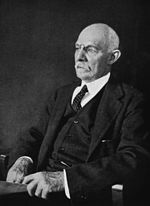William Stewart Halsted, Date of Birth, Place of Birth, Date of Death
TweetWilliam Stewart Halsted
American surgeon
 Date of Birth: 23-Sep-1852
Date of Birth: 23-Sep-1852
 Place of Birth: New York City, New York, United States
Place of Birth: New York City, New York, United States
Date of Death: 07-Sep-1922
Profession: surgeon
Nationality: United States
Zodiac Sign: Libra 
About William Stewart Halsted
- William Stewart Halsted, M.D.
- (September 23, 1852 – September 7, 1922) was an American surgeon who emphasized strict aseptic technique during surgical procedures, was an early champion of newly discovered anaesthetics, and introduced several new operations, including the radical mastectomy for breast cancer.
- Along with William Osler (Professor of Medicine), Howard Atwood Kelly (Professor of Gynecology) and William H.
- Welch (Professor of Pathology), Halsted was one of the "Big Four" founding professors at the Johns Hopkins Hospital.
- His operating room at Johns Hopkins Hospital is in Ward G, and was described as a small room where medical discoveries and miracles took place.
- According to an intern who once worked in Halsted's operating room, Halsted had unique techniques, operated on the patients with great confidence and often had perfect results which astonished the interns.
- He was later called the Father of Modern Surgery. Throughout his professional life, he was addicted to cocaine and later also to morphine, which were not illegal during his time.
- As revealed by Osler's diary, Halsted developed a high level of drug tolerance for morphine.
- He was "never able to reduce the amount to less than three grains daily" (approximately 200 mg).
- Halsted's addictions resulted from experiments on the use of cocaine as an anesthetic agent that he performed on himself.
Read more at Wikipedia

